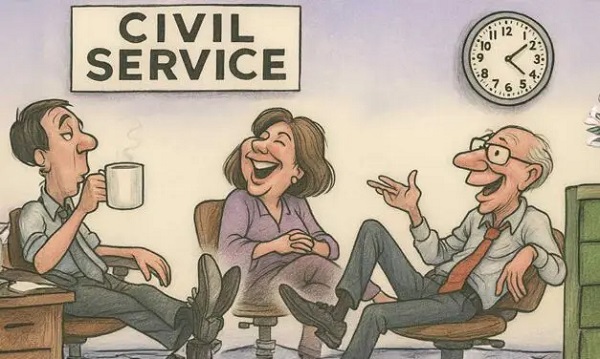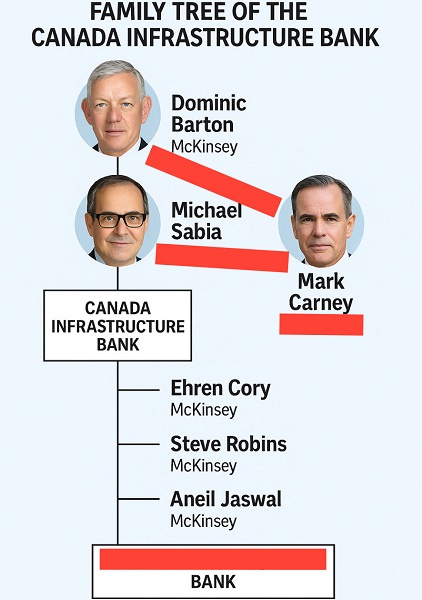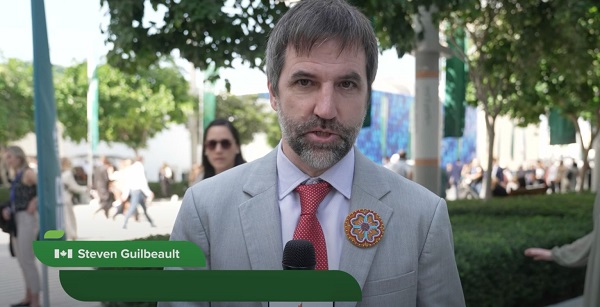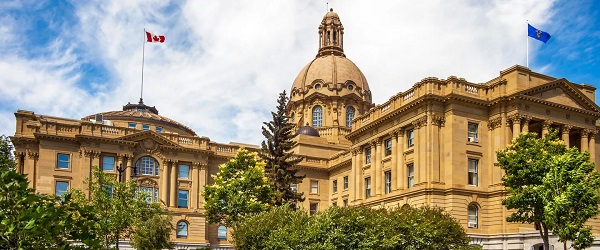Business
Ottawa’s civil service needs a Chrétien-style reset

This article supplied by Troy Media.
If Carney followed Chrétien’s lead, he could cut 64,000 jobs and save $10 billion a year
They say bureaucracy grows to meet the needs of the expanding bureaucracy. That certainly seems to be Ottawa’s motto these days, with the number of federal civil servants swelling by more than 100,000 over the past decade.
As the bureaucracy grew, so did the resources it devoured and the burden it dumped on the federal budget. If the Carney government is serious about tackling its spending problem, it has no choice but to shrink the civil service. To its credit, the government has already signalled this may be coming, with Finance Minister François-Philippe Champagne directing ministries earlier this month to cut program spending by 7.5 per cent in 2026-27, with deeper cuts to follow.
Payroll tells the story. When Justin Trudeau came to power in 2015, Ottawa was spending about $39.6 billion on employee compensation. Last year, that figure hit $71.1 billion—a staggering 79.5 per cent jump in nine years. Numbers that big are hard to picture, so here’s what they mean: $71.1 billion equals roughly $1,700 per Canadian, or about $7,000 for a family of four.
That’s a lot of money. Given those costs, Canadians are right to ask whether they’re getting anything close to value. The answer, judging by opinion surveys, is no.
Passport lines still snake around the block. Clearing customs at the airport remains a test of endurance. And if you dare call the Canada Revenue Agency, pack a lunch, you’ll be on hold long enough to need it. For all the extra spending, everyday frustrations remain the same.
If all that spending hasn’t delivered better results, it’s a flashing neon sign that resources are being wasted. The civil service is a prime candidate for cuts that could be made with little, if any, impact on the quality or speed of services Canadians actually receive.
The average compensation for a full-time federal job is now around $150,000 a year. That includes salary, taxpayer-funded pension contributions, and a generous menu of benefits. By contrast, the average Canadian earns about $60,000—the same taxpayer footing the bill— and the inequity speaks for itself.
The problem isn’t just the cost but the culture. In the private sector, businesses constantly ask whether jobs are necessary and whether people can be redeployed. In government, the tendency is to keep hiring, with little scrutiny of whether those positions are truly needed.
Yet there is precedent for Ottawa getting serious about reform. In the 1990s, Jean Chrétien’s government undertook a sweeping review that eliminated more than 17 per cent of federal positions.
If the Carney government followed that model, it could trim about 64,000 taxpayer-funded jobs and save at least $10 billion a year.
With Ottawa projected to run a deficit of over $40 billion this year, one of the largest structural deficits outside of the pandemic years, Canadians should expect—no, demand—an equally ambitious review.
Renaud Brossard is vice-president of communications at the Montreal Economic Institute, a think tank with offices in Montreal, Ottawa and Calgary.
Troy Media empowers Canadian community news outlets by providing independent, insightful analysis and commentary. Our mission is to support local media in helping Canadians stay informed and engaged by delivering reliable content that strengthens community connections and deepens understanding across the country.
Business
Bill C-8 would allow minister to secretly cut off phone, Internet service

From the Canadian Constitution Foundation
“I worry that this law could be used to secretly cut off political dissidents from their phone or Internet service on the pretense that they may try to manipulate the telecom system”
The Canadian Constitution Foundation is concerned about the civil liberties implications of the Carney government’s proposed cyber security bill, C-8, which would allow the minister of industry to secretly order telecommunications service providers like Telus, Bell and Rogers to stop providing services to individual Canadians.
The minister would be allowed to make such an order if she has “reasonable grounds to believe that it is necessary to do so to secure the Canadian telecommunications system against any threat, including that of interference, manipulation, disruption or degradation.”
An individual who does not comply, including by failing to keep the order secret, could face fines of up to $25,000 for the first contravention and $50,000 for subsequent contraventions. Businesses could face fines of up to $10 million for the first contravention and up to $15 million for subsequent contraventions.
The orders would remain secret indefinitely, with the minister required only to present an annual report to Parliament on the number of orders made and her opinion on their necessity, reasonableness and utility.
CCF Counsel Josh Dehaas said that the power to cut off the Internet or cellphone service of Canadians is a “very serious power that requires very strong safeguards, which are presently lacking in the bill.”
“While this power may be necessary in some cases to prevent cyber attacks, it also poses serious risks to civil liberties,” Dehaas said. “I worry that this law could be used to secretly cut off political dissidents from their phone or Internet service on the pretense that they may try to manipulate the telecom system,” Dehaas explained. “Such an action would violate our most cherished freedoms including free speech.”
CCF Litigation Director Christine Van Geyn said that the government cannot be trusted with such a power unless proper safeguards are in place.
“You may think that the idea of the government cutting off political dissidents from the necessities of life sounds far-fetched, but that’s exactly what happened during the 2022 Freedom Convoy protests in Ottawa,” she said. “The federal government ordered banks to freeze hundreds of bank accounts without any judicial authorization, cutting protesters off from their money in the middle of a very cold winter.”
“Although the Federal Court agreed with the CCF that freezing bank accounts this way violated the constitutional right to be secure against unreasonable searches and seizures, that kind of damage isn’t easily repaired,” Van Geyn added.
Ottawa has appealed the Federal Court’s finding. The CCF is awaiting a decision from the Federal Court of Appeal.
Dehaas said that Parliament should consider requiring either judicial pre-authorization or an immediate, automatic judicial review of any decision to cut off an individual or business from their Internet or phone.
The CCF is also concerned that Bill C-8 would allow the minister to weaken telecommunications companies’ encryption standards, allowing for unconstitutional access to Canadians’ private information.
Finally, the CCF is concerned that the bill could allow the minister or any person designated by the minister to engage in unconstitutional searches.
Joanna Baron, the CCF’s Executive Director, said that Canadians must be vigilant about their constitutional rights and freedoms because they can be easily taken away, especially in times of crisis.
“I would encourage Canadians to fight for their freedoms, whether it’s by taking the CCF’s free privacy course, signing up for our weekly Freedom Update newsletter or becoming a monthly donor,” Baron said.
“Concerned Canadians are also encouraged to write to their MPs using our form letter, to tell them to amend these bills to ensure Canadians’ rights to privacy and free expression are protected,” Baron added.
Alberta
Taxpayers: Alberta must scrap its industrial carbon tax

-
Carney praises carbon taxes on world stage
-
Alberta must block Carney’s industrial carbon tax
The Canadian Taxpayers Federation is calling on the government of Alberta to completely scrap its provincial industrial carbon tax.
“It’s baffling that Alberta is still clinging to its industrial carbon tax even though Saskatchewan has declared itself to be a carbon tax-free zone,” said Kris Sims, CTF Alberta Director. “Prime Minister Mark Carney is cooking up his new industrial carbon tax in Ottawa and Alberta needs to fight that head on.
“Alberta having its own industrial carbon tax invites Carney to barge through our door with his punishing industrial carbon tax.”
On Sept. 16, the Alberta government announced some changes to Alberta’s industrial carbon tax, but the tax remains in effect.
On Friday night at the Global Progress Action Summitt held in London, England, Carney praised carbon taxes while speaking onstage with British Prime Minister Keir Starmer.
“The direct carbon tax which had become a divisive issue, it was a textbook good policy, but a divisive issue,” Carney said.
During the federal election, Carney promised to remove the more visible consumer carbon tax and change it into a bigger hidden industrial carbon tax. He also announced plans to create “border adjustment mechanisms” on imports from countries that do not have national carbon taxes, also known as carbon tax tariffs.
“Carney’s ‘textbook good policy’ comments about carbon taxes shows his government is still cooking up a new industrial carbon tax and it’s also planning on imposing carbon tax tariffs,” Sims said. “Alberta should stand with Saskatchewan and obliterate all carbon taxes in our province, otherwise we are opening the door for Ottawa to keep kicking us.”
-

 Business2 days ago
Business2 days agoDominic Barton’s Shadow Over $1-Billion PRC Ferry Deal: An Investigative Op-Ed
-

 Censorship Industrial Complex2 days ago
Censorship Industrial Complex2 days agoCanada To Revive Online Censorship Targeting “Harmful” Content, “Hate” Speech, and Deepfakes
-

 Alberta2 days ago
Alberta2 days agoAlberta refuses to take part in Canadian government’s gun buyback program
-

 Alberta2 days ago
Alberta2 days agoOrthodox church burns to the ground in another suspected arson in Alberta
-

 Alberta2 days ago
Alberta2 days agoAlberta puts pressure on the federal government’s euthanasia regime
-

 Fraser Institute1 day ago
Fraser Institute1 day agoAboriginal rights now more constitutionally powerful than any Charter right
-

 Business1 day ago
Business1 day agoNew PBO report underscores need for serious fiscal reform in Ottawa
-

 Alberta1 day ago
Alberta1 day ago$150 a week from the Province to help families with students 12 and under if teachers go on strike next week









